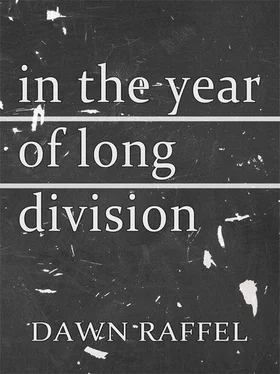It was, anyway, the dog who sat. It was the dog who sat, and whined, and seemed eager, ready, poised to jump — a silver-nosed projectile. Make no mistake: What there was in the eyes was a roiling sense of injustice, at war with appeal to the master for release.
“Sit,” the man said.
Defeat, humiliation. In the eyes of the dog, in the dream of the eye, a life bereft of hope.
It was not without rage.
“The dog,” she said. And on seeing the man did not see the question, “What do you call the dog?” she said, this creature in an anguish of malevolent restraint. If there was something she had learned, it was this: Familiarity or friendship, or maybe it was knowledge, could vanquish all. She had had an education. “To what does he answer to?” she said.
“Penny,” the man said.
“Penny?” she said. “Penelope?”
The man did not repeat it. He patted himself on the front of the shirt as if seeking tobacco, change, or some flawed comfort pocketed in haste.
That the dog was a female, to think of it — Penny! Gray Penny — why, she had to admit, it altered the way the dog looked. She had clung to assumption, had she not, adhered to an idea of a rabid masculinity (a cat being female).
The obvious made obvious—“Penny,” she said.
So called, the dog, Penny, arose, an obvious and tawdry nuzzler of knees, of dress, of dangled pocketbook.
Eyeballed, the master shrugged.
“Mrs. — Ida,” she said, unclasping, clasping. Buried within, amid the billfold, pills, a brush, pressed powder in a compact, deep inside in her pocketbook, her scrap, damply rumpled, a secret re-concealed, was laid uneasily to rest. She had nothing to offer the dog at all. So as not to be sidetracked (how had it taken all this while, her whole life, it seemed, with its paid education, its civic tour of duty, and so forth, its beige corrective shoes, for her to get to where she was?), so as not to be distracted, she spoke of Mr. Edward, invoking his health. That such a man such as he should have to suffer—
“Rex,” the host said, hand held gauntly out to her, and yellow-nailed. Of jaundiced manners, nonetheless the looming and undeniable host: Did she maybe require a beverage? he said.
“Me?” she said. Thinking, could she take that hand?
“Yourself,” Rex said. “The one and the same.” For it was not for Mr. Edward, he said, he suspected, that she, Ida, honestly had come to here to him—“now, Ida, now have you?”—and wasn’t she here on behalf of herself? He could recognize the look, the hesitant gait. “You have suffered a loss,” Rex said.
No, she would not take that hand. Her face, she feared, was moist, a telltale sheen about the nose. Applied frugally, her powder had surely been absorbed. It was hot. The hat itched. She had drool on her stockings. “Penny,” she said to no discernible result.
“Penelope,” she said to hot breath on the shin.
The hand still waited.
“Water,” she said. She would relish a cold glass of water with cold crushed ice.
“Can’t do,” Rex said. “The water isn’t drinkable.”
“Goodness,” she said, and then, “You’re wrong.” She heard herself, took note of herself, feeling, then seeing the slatted day darken through a window, midday gone. The hour entered the bloodstream. Pure wrought iron. “I am here on a promise,” she said. “I am keeping my promise, true to my word. That’s all.”
With this, the hand withdrew itself.
Penny affected a nothing less than hangdog expression.
She, Ida, flinched. “Mr. Edward,” she said, her rather enfeebled, yet, of course, still deeply respected employer, of mutual acquaintance, she presumed, had sent her, insisted, in fact, that the matter was entirely utmost. She was loyal to a fault, she had to admit. She said, “He said you’d know.”
“I know. You have suffered a loss,” Rex said as he apparently followed and somehow invaded her gaze. It fell to the examining table. “Look at me,” he said. “Do you know your eyes are red?”
She touched her eyelids — one and the other, in an almost involuntary, foolish, she might have conceded, gesture, as if with the faith that a person could finger a redness there, could identify a color or shade through skin, as if the senses had been thoroughly denied their limitations. She fingered moisture. Dismayed, she tried again, confirmed it: Pink, at least, as if fear of the thing was the thing that had made it so. This and the man’s presumption. “The air,” she said. “The air,” and thought, dust — dust and worse. Motes, she thought, and here she was, a swollen-ankled woman with a compromised mien. She was hugging, even choking, her pocketbook; would that she were in it, inside it, she and her sundries, she and her necessities, she and her scrap. If only she were hidden in the bowels of the thing! But here she was, alone in a room with a need and the voice in her head; a man, of course, certainly, a man, of course, and rather less expectedly, rather more pointedly, a dog, a carrier, heaven knew of what, and she herself, Ida, with a delicate system, thirsty and worn, her forearms moist on poreless leather, pockmarked; the irritant spores — was it spores? — the word that inserted itself in her thoughts; it was a general invisible itch.
Rex smiled.
Just smiled yellowly, the gaps in abundance, while Penny continued to conspicuously breathe.
“What are you?” Ida said, attempting — she wouldn’t have argued, had anyone asked — in this way to regain herself. “Are you some kind of doctor? Some kind of medical doctor?”
“Do I look like a medical doctor?” he said.
She smelled decay.
“No,” she said. “You look, shall I say it, unwell, or, if you don’t mind my saying it, indisposed, in the spirit in which it is meant, of course.”
“Of course,” Rex said.
“I mean,” she said, “that is — Penny, Penelope, please,” she said. “Desist.” Forbearance was in order. She needed refreshing. The towels, as previously noted, were stacked; there was a look of spit and rub about the host, this Rex.
She had prided herself on her sensitive skin: “Look at this rash,” she would say as if saying, see my ring, do take care with the china, lifting her chin to a minimal light.
Damp palms on dress, not a hint of relief in the offing—“Is there nowhere,” she said, “where a person can possibly sit?”
Rex answered by way of a sideways nod: The table, take it or leave it, the nod seemed to say.
“Are you, you mustn’t be serious, are you?” she said.
“That is to say, in earnest,” she said.
“Oh,” she said. “Oh, dear.”
There was a look of wanton shedding and worse about the dog.
Given a moral interest, even more than a moral interest in this, Ida made up her mind: She would tell Mr. Edward, as soon as she saw Mr. Edward again, or soon enough, or in due course — dear sweet man, to think of it! — she would say she had thought that she would not, that she would never, at least in this lifetime, believe her, do what she had done, or rather, was about to do, she with her special-ordered soap (twice daily bather!), she with her conditions, yet do it she did. She sat with a crinkle.
The glass was in her hand.
“Your loss,” Rex said.
Wrung towel of the sort to be found in an ill-washed restroom in whatever rest stop or station of transit, a bane to the skin; it was tight in her opposite fist. “Mister,” she said, to a shhh .
“Mister Edward,” she said.
“Yourself,” Rex said, as he had said, it seemed to her, before — herself indeed! She heard a newfound element of coaxing in the tone of the voice. “Ida,” he said, “the part you remember.”
“The part I remember of what?” she said — her self-same self indeed! He meant for her to offer it, doubtless. What came to her (eyes closed, feet up, for they were, after all, swollen and she was not young, not quite, and had she not traveled considerable distance? And evening was on her, ambiguous balm, and here he was, her reckless host, slurring encouragements, and here was Penny breathing, Penelope breathing, breathing, and here she was, Ida, in spite of herself, verbosely limping Ida, methodical Ida; she knew how she was seen, for she was not unintelligent, not unaware, not a bit: She had a putative gift of perception, or so she had heard, or anyway had overheard, or at the least had told herself), what came to her all but unbidden was this: a surface, a morsel of a life, her life. There were floors she had learned with hands and knees, by heart, by skin — the issue of servants; intransigent bones of the body at its work. The rooms she had moved through! Chairs she had dusted with only her fingers, scavenged whiffs of scent: soap, wood, drains, fear (where was it she had put that glass? and had it not pearled?), a scent of a delectable decay; why, it went, did it not, with the slowing over time of an asymmetric pace, of a motion in the world, the parts she had inhabited, barbiturate of dutiful living. She could almost picture the voice in her head, in her ear: You have suffered a loss, you have suffered an injury, Ida, Ida. What was there of this? She could see, if she tried (she did, did try), she could see Mr. Edward’s musty desk — the lamp shade green, the blotter green — and there at the woolly knee of him, a girl. There were ribbons she had worn, a dress she had sewn, a doleful hat: black with net with black dots in front of her forehead, an elegant obstruction, herself a proper orphan, funereal child, and after, the force she could feel of an arm, the black, black hair of an arm, sweaty and vivid as invention. Well, perhaps she had invented it, a practical woman, something from nothing. A hiccup of the mind: You have suffered an injury, Ida, Ida. Her body at an angle from the wrong-angled leg, a weed in the hand, her hair. “Blood from a turnip,” she said.
Читать дальше












